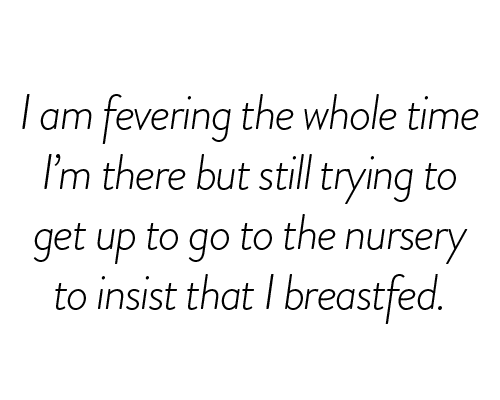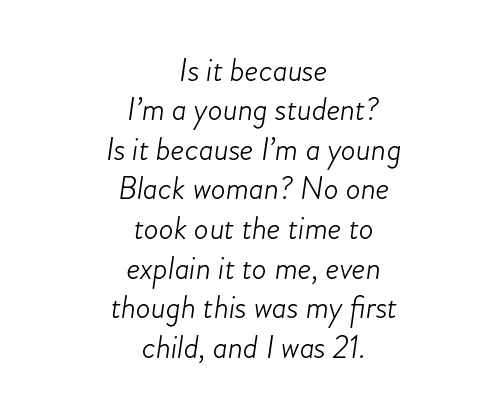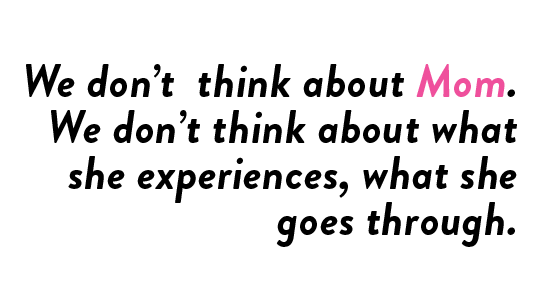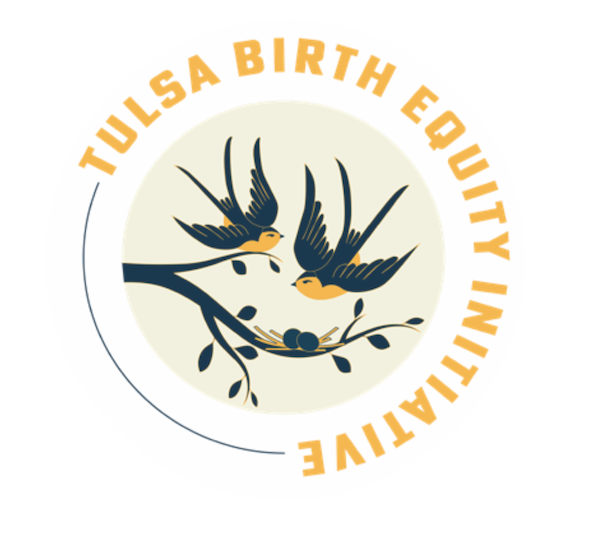Black Maternal Health
In the following narratives, we are invited into the true and vulnerable experiences of Black maternal health in Oklahoma. These women strive to create a future in which Black women’s child-birthing experience can be filled with less pain and suffering, and more hope and joy, through self-advocacy and communal support.

Black mothers and babies in Oklahoma are dying at an alarming rate. Compared to their white counterparts, Black women are nearly three times more likely to die during or shortly after pregnancy. [1] For every 1,000 Black infants born, approximately 13.8 will die within the first year of birth, a rate that is nearly twice as high as the white infant mortality rate. [2] Both nationally and in Oklahoma, Black maternal and infant mortality rates are climbing [3,4], representing thousands of early graves, a rising sea of grief and loss.
In 2020, the Oklahoma Maternal Mortality Review Committee released their inaugural report, summarizing the state of maternal health in Oklahoma over the past two decades. Data disaggregated by race revealed significant disparities. Several reported measures of postpartum health were worse for Black women, including the rates of breastfeeding initiation and postpartum depression. [5] In addition to having a higher mortality rate, Black infants had higher preterm birth rates (14.2 per 1000) compared to infants of all races (11.1 per 1000), signifying the potential for additional health complications. These statistics cannot fully capture the experiences of Black mothers, but they are an important first step in understanding disparities in maternal health.
What causes such significant disparities? The answer lies in the cultural, societal, and institutional contexts of Black mothers’ lives—in short, what it means to be a Black woman in America. Researchers have found that the cumulative effects of systemic oppression and racism lead to physiological changes in Black womens’ bodies, a concept called “weathering.” [6] These subtle biological shifts put Black women at a higher risk of pregnancy and childbirth-related complications. Education and income do not offer much protection against adverse pregnancy outcomes — available data shows that a Black woman with financial stability and higher education is still more likely to lose her baby than a white woman with an eighth-grade education. [8]
Aside from physiology, both structural and cultural factors contribute to the deaths of Black mothers and infants. Pervasive bias in the healthcare system significantly shapes Black women’s experiences of pregnancy and childbirth. Multiple studies have found that due to stereotyping and bias from healthcare providers, people of color tend to receive a lower quality of healthcare compared to white individuals, even when factors such as insurance status and income are accounted for. [9] As the following narratives illustrate, Black women’s concerns and symptoms are often dismissed by healthcare providers, leading to negative health consequences and unnecessary suffering for women and their children.
In the following narratives, Black mothers in Oklahoma share their experiences of maternal health, in all their nuance and complexity. They tell stories of medical racism and unheard cries for help, of lost time with their babies and the guilt they must carry. They ask us to pay attention, listen closely, bear witness to their grief. They lay bare their lives in the hopes that their experiences will inspire change. The stories here are vulnerable, brave, and honest; the stories here represent the landscape of Black maternal health in Oklahoma.
Black Maternal Health
In the following narratives, we are invited into the true and vulnerable experiences of Black maternal health in Oklahoma. These women strive to create a future in which Black women’s child-birthing experience can be filled with less pain and suffering, and more hope and joy, through self-advocacy and communal support.

Black mothers and babies in Oklahoma are dying at an alarming rate. Compared to their white counterparts, Black women are nearly three times more likely to die during or shortly after pregnancy. [1] For every 1,000 Black infants born, approximately 13.8 will die within the first year of birth, a rate that is nearly twice as high as the white infant mortality rate. [2] Both nationally and in Oklahoma, Black maternal and infant mortality rates are climbing [3,4], representing thousands of early graves, a rising sea of grief and loss.
In 2020, the Oklahoma Maternal Mortality Review Committee released their inaugural report, summarizing the state of maternal health in Oklahoma over the past two decades. Data disaggregated by race revealed significant disparities. Several reported measures of postpartum health were worse for Black women, including the rates of breastfeeding initiation and postpartum depression. [5] In addition to having a higher mortality rate, Black infants had higher preterm birth rates (14.2 per 1000) compared to infants of all races (11.1 per 1000), signifying the potential for additional health complications. These statistics cannot fully capture the experiences of Black mothers, but they are an important first step in understanding disparities in maternal health.
What causes such significant disparities? The answer lies in the cultural, societal, and institutional contexts of Black mothers’ lives—in short, what it means to be a Black woman in America. Researchers have found that the cumulative effects of systemic oppression and racism lead to physiological changes in Black womens’ bodies, a concept called “weathering.” [6] These subtle biological shifts put Black women at a higher risk of pregnancy and childbirth-related complications. Education and income do not offer much protection against adverse pregnancy outcomes — available data shows that a Black woman with financial stability and higher education is still more likely to lose her baby than a white woman with an eighth-grade education. [8]
Aside from physiology, both structural and cultural factors contribute to the deaths of Black mothers and infants. Pervasive bias in the healthcare system significantly shapes Black women’s experiences of pregnancy and childbirth. Multiple studies have found that due to stereotyping and bias from healthcare providers, people of color tend to receive a lower quality of healthcare compared to white individuals, even when factors such as insurance status and income are accounted for. [9] As the following narratives illustrate, Black women’s concerns and symptoms are often dismissed by healthcare providers, leading to negative health consequences and unnecessary suffering for women and their children.
In the following narratives, Black mothers in Oklahoma share their experiences of maternal health, in all their nuance and complexity. They tell stories of medical racism and unheard cries for help, of lost time with their babies and the guilt they must carry. They ask us to pay attention, listen closely, bear witness to their grief. They lay bare their lives in the hopes that their experiences will inspire change. The stories here are vulnerable, brave, and honest; the stories here represent the landscape of Black maternal health in Oklahoma.
Narrative #1
“I Wasn't Being Heard”
Stories from During and After Pregnancy
I wish the doctor would listen more. Having my doctor not listen to me resulted in me being admitted into the hospital.
[In] March 2013, I gave birth to my fourth child, a little girl. Each pregnancy was so different, but this one was especially different and well worth the wait. I prayed for four kids, but I was not sure how God was going to answer my prayers. Then God chose to bless me, the year I lost my mom was also the year I was blessed with [my daughter].
Three weeks goes by and I am having a hard time breastfeeding due to not feeling well. I reached out to a friend who is a breastfeeding consultant, and she continued to encourage me to keep breastfeeding. I continued to feel worse, and my husband took me to urgent care, but I was unable to stay due to having no milk supply for my babysitter.
Once home, I called my primary care doctor and provided the nurse with the symptoms. I was experiencing what felt like my asthma—shortness of breath, back aches, wheezing, and fatigue—but it was different. The nurse scheduled an appointment, and my father took me because my husband’s short term family leave had ended. By this time, my symptoms were worse, and when I got to the office, my father had to wheel me in with a wheelchair. I felt so bad that I was praying that they would admit me.
[At my appointment], the doctor wasn’t listening to me, to my concerns about what was really going on, when I was saying “These are the things that I am experiencing. These are the problems.” I’m not faulting her, by no means. But I felt so bad that day. I wasn’t being heard.
They sent me down for chest X-rays, they brought me back up, they told me that I had double pneumonia. I thought I would be admitted since we now knew what was going on. Instead, the doctor said they were calling in medication for me to take at home. I just started to cry. I just wanted to breathe.
I dealt with double pneumonia for four weeks. I was taking the medication and following the treatment protocol and continued to follow up with my doctor. During that time, I felt like I was calling my doctor daily, asking for help in order to feel better. I’m like, “I’m not getting any better,” and she’s like, “Well, you have to give the medicine time to work, you just have to be patient.” I was to the point where I was just about to give up. Because I thought, “Well, maybe I’m crazy.” Because I keep telling her I don’t feel good, I’m not getting any better, but she’s saying “Let the medicine work.”
On May 11, 2013, I did not sleep at all, [because] my back spasms were so bad I could hardly take a breath, I could hardly walk, my chest was hurting, and I started to have dizzy spells. My husband was gone with two of our children to their basketball event. My oldest daughter came home from college to be with me while they were away. The baby was crying, and I decided to get out of bed to get her and felt like I was about to pass out due to a lack of oxygen. I asked my daughter if she could please watch the baby while I drove myself to St. John’s Hospital to just get examined.
I arrived at the hospital and I was advised to write down my symptoms and take a seat. Before I could get to the seat, they were rushing me to the back and applying the ECG machine, inserting an IV, checking my oxygen, and blood pressure. I was there for several hours and numerous tests were ran. The doctor came in my room and told me I had Postpartum Cardiomyopathy, which meant I was in heart failure, and that my heart was functioning at 15%. With one more day, I would have probably had a heart attack. The hospital was saying that because I had just had a baby and the symptoms that I had written down, it should have been an immediate response that something wasn’t right.
I was overcome with anxiety, feelings of depression, and wondered why this was happening to me. I just wanted to be the best mom to my kids and felt like I was not going to be there for them.
I had to start medication so I had to stop breastfeeding. I was devastated that I couldn’t breastfeed. The breastfeeding/lactation consultant was just like, “Just pump and dump til you can be off this medicine.” But I was like, “I don’t know how long I’m going to be on this medicine.” The doctor said, “This is indefinite.” And that was a hard blow. Then I felt like a failure to [my baby]. Because I felt like the other kids got to have me more than her. And it was really hard.

With my first child, my doctor was amazing. My intention was to labor at home so I had a midwife and I had an OB. Because I was only 19, they took the time to explain to me the difference in bodies and how the uterus is shaped, and sometimes you are able to labor at home and sometimes you’re not. So they prepared me for the alternative if I’m not able to labor at home.
I did have to have a C-section with the first child. So the medical staff at that time—some were great, some felt like my pain level wasn’t as high as I stated it was and I didn’t feel as bad as I stated I was feeling. That was a little difficult for me because I’m a 19 year old woman with a newborn and I knew something is just not right. I’m fevering the whole time I’m there but still trying to get up to go to the nursery to insist that I breastfeed.
The day before I was supposed to be released, they realized that my incision had reopened. Then it seemed like the care for me changed because it was a reality check that “Oh, she did know that something was really wrong.”

Barriers: State Versus Private Insurance
When I had my first child, I was on private insurance under my parents, and the access to care, of course, was not limited to me because I had private insurance. My second child, I used private and state. A lot of people that I talked to said that they are treated differently with state insurance versus private insurance. And with the state insurance I realized that you’re limited on what doctors you can pick. If you are late or if you miss an appointment, the restrictions for you are so much harder if you’re on state [insurance] versus private. It’s just like, you have no room to make a mistake on state insurance. So I did that with the second child and the third and fourth I was on private [insurance].

Barriers: Attitudes of Healthcare Providers
I just went to a doctor’s appointment, about some pain I had, and I was real skeptical about going to this appointment. I had anxiety about going. [It was] a new doctor I didn’t know, so of course my anxiety was up. And everything I said to the doctor about my pain—where I was hurt—he discounted everything. I left out of there feeling like, why did I go? I felt like I wasted an hour of my time, to go in there feeling in pain, and to leave feeling still in pain with no plan of action, no “let’s try this.” And then you get discouraged. Cause then you’re like, okay, well, I guess I’ll just deal with the pain. I’ll just continue taking Tylenol and Advil. But at some point the pain gets worse, some people self-medicate. So we need to figure out a way to teach. And let people know that there is other doctors. That one doctor don’t make one decision. There’s multiple doctors, so you don’t stop there.
Initiatives on Black Maternal Health
Most moms of color and their family members do not know the warning signs. They don’t know how to advocate for their loved ones. More education going out about those warning signs is so beneficial. Not just for you as the patient but for the family, letting them know that they too can advocate for the patient.
I think it is remarkable that education is pushed, but now how do we make sure that they do it? How do we get them to the point of being comfortable enough to do it? A lot of them will go in and will not ask a question. And we can prepare them to ask questions, but the doctor might cut them off and won’t let them. So that’s the advocacy part.
I think we need to do a round table discussion with medical professionals. A meet and greet, where the doctors or nurses or nurse practitioners are out of their comfort zone. I’ve done it here at the health department through Her Voice, which is an organization I’ve started.

Narrative #2
"Listen To Us”
To be a woman in Oklahoma means to have your voice silenced. To be a woman in Oklahoma, you have to have a quiet strength about yourself that you are able to project no matter where you are.
Stories from During and After Pregnancy
I had to get a pregnancy test four times. I kept telling the doctors, “I think I’m pregnant,” and they’re like, “Nope, it doesn’t show.” They just wouldn’t believe me. I think that they thought I was trippin’ because it was really within like a two to three week time frame—but I just knew. And I tried to tell them that, and they’re like, “Nope.”
I finally went and took a home pregnancy test, and it showed that I was pregnant, then I went back and took the pregnancy test [at the doctor’s office], and they were like, “Oh, you were right,” and I’m like, “I tried to tell you.” That was one of my first experiences of learning that I have to use my voice if I want to be heard in any circumstance.

I [had to take a] drug test every single time I went into the doctor’s office. I didn’t know if that was common. I was like, is it because I’m a young student? Is it because I’m a young Black woman? No one took out the time to explain it to me, even though this was my first child, and I was 21.
I ended up moving and transferring from OSU [Oklahoma State University] Tahlequah to OSU Tulsa. I followed up with the doctors at OSU in downtown [Tulsa] just to make sure I was healthy. My due date had been changed once from the end of January to the beginning of February. February 10th was my actual date.I went in [to the hospital] on the 5th, a Saturday morning, and I’m like, “I’m having contractions, something doesn’t feel right.” I told them, “This is my first baby,” [and] they were like “It’s probably Braxton-Hicks [false contractions before labor]. Don’t worry about it. You’re not dilating, you’re fine.”
I stayed for several hours, [and my cervix] never actually dilated past 1 [centimeter], and so they’re like, “We’re going to just send you home, you lay down, you rest, you still have 5 more days on your due date. You should be fine.” And I’m like, “Hmm, that really doesn’t feel right, but okay.” So we left.
It’s not unrealistic to say okay, well they sent me home because I could have just been having false contractions. That is a reasonable assumption. But had I been more adamant, would they have kept me? Would they have kept me had I looked differently? Who knows?
We need a “Hear Her” policy where we hold medical staff accountable. Accountable don’t mean filing a lawsuit. That’s not what I’m talking about. Accountable means that we have a sit-down with that doctor and go through that person’s medical chart, and see what happened. Cause if this person had a traumatic birthing situation in the hospital and certain things was left out of the progress notes then we need to come up with some type of plan to change that birthing process or plan for that hospital. A “Hear Her” policy would mainly be about hearing the client’s story and seeing how we can work through a process to change and improve. Make the next person’s situation better than what yours was.
Another thing— making sure we are offering moms everything that’s out there. Some way, somehow, incorporating these programs in these OB and pediatric clinics. It’s really hard to educate or let moms know about the programs that are created to support them. With my oldest one, if I had known that Children First existed, that I could have had a nurse from pregnancy up til she was 2, I would have taken advantage of that.
So much more could be put into that policy on how we can support women of color.

Takeaway Thoughts
When I hear some of the stories of how some ladies have been treated from the pregnancy up through the delivery, I am like, overwhelmed. My story does not even compare. I survived after the fourth one.
If we could do a Hear Her policy, then we can help these women. Cause a lot of these women who experience trauma or some type of mental health breakdown at some point during their pregnancy or beginning, middle, or end, they don’t get to enjoy their pregnancy. And then after their child is born, they have guilt.

We don’t think about Mom. We don’t think about what she experiences, what she goes through. For me to go through that situation with my last child, and to learn that I was almost one day from having a heart attack or even leaving this earth, I was like, “Wow, I have to do something to promote education.” I figured that the best way for me to educate women is to throw them a baby shower. So I host the community baby shower. And that way I bring dad, I bring the whole family cause I can educate the grandparents, I can educate everybody, and we do a fatherhood piece, we do a safe sleep piece, but I bring in programs that support the whole family. It’s just so much that goes into that Hear Her campaign. And I just think that the Hear Her policy would be amazing.
I went home and I was in extreme pain all day that Saturday. It was horrible pain. I end up waking up at 5 on Sunday morning, and I’m telling my mom, “Something doesn’t feel right. I think I need to go back to the hospital because something is not okay.” And my mom is like, “Do you want to go back to the same hospital? Or do you want to go to Hillcrest [another hospital]?” And I’m like, “Well, something didn’t feel right there, so let’s go to Hillcrest because I just feel like this will be a better choice.” This was not where my doctor was, this was not the hospital I was supposed to go to deliver my baby, but something just told me to go to Hillcrest.
So I go to Hillcrest, we go through the ER, tell them the situation, that [the other hospital] sent me home, and I’m starting to get concerned. I’ve been having contractions for 24 hours, and I’m not dilating. So they check my baby’s heartbeat, and he’s okay. They check me and they’re like, “Well, you’re not dilating, but you’re at 40 weeks, just about.” And they’re like, “Do you want to go ahead and induce your labor? And I said, “Yes. Let’s do this cause I want to meet my baby.”
They give me something to induce my labor, and I start having contractions back to back. So at this point I should be dilating and I’m not dilating at all. I don’t dilate past like—two and a half [centimeters] maybe. So they’re starting to get concerned, and they’re like, “We need to check your baby’s heart rate again.” Well, my baby’s heart rate is starting to slow, so they’re starting to get concerned. So, they say, “Okay, we’re going to give you a little bit more time, and then we’re probably going to do a C section.”About an hour and a half or so later, they roll me over to check my baby’s heart rate again, and I’m in a pool of blood. At this point, they’re like, “We’re going to do an emergency C section.” I was going to do natural labor, I wasn’t going to have an epidural, like this was all completely unexpected. I wasn’t even at the hospital I was supposed to be at.
They rush me back, they open me up, and my son is delivered. All I see is a head of hair. By the time they took him to the nursery and my mom walked back, I started coding. And I lost pints of blood. I started hearing the doctors panic, and they’re like, “Her uterus won’t contract. Oh my goodness, it’s not working, what’s happening?” I hear this panic, and I’m like, “What’s going on over here? What’s happening?”
My mom comes back and they won’t let her in because at this point, I’m losing blood, I’m going in and out and they’re not sure what’s going on. The doctor comes over [to me] and she’s like “Your uterus will not contract and your placenta detached from the uterine wall. And so we’re going to have to give you an emergency hysterectomy. So do you consent to this?” And I’m like, “Well first of all, am I dying?” And she’s like, “Well, you’re losing a lot of blood, and we can’t stop the bleeding.” And I said, “Well, you have to do it then.” So they put me under and I feel all the tugging, I hear the panic in their voices, and I hear the doctors saying, “She’s only 22, and this is happening to her.”
I ended up having the emergency hysterectomy. They took out my uterus but I did get to keep my ovaries. At one point, I remember waking up and asking the anesthesiologist, “Am I dying?” He says to me, “You’re at a stop sign. And you can either go or stay.” It’s crazy cause I literally almost died. I lost a lot of blood.
I think about those things because what if I would have went back to that same hospital? Would they have caught this? Would they have just sent me home again? Would they have been able to complete the surgery so I would still be here to see my son?
I went into the hospital already with the life-changing experience of being a young mom at 22, with my first child, but [I came] out of the hospital being a young mom, 22, with my first baby, but also having the ability to have any other babies being taken away completely and having the [possibility] where I could have not walked out at all. It’s a little unnerving, to say the least. But I’m thankful that I listened to that inner voice and went to the hospital that I felt like I should have went to.
Experiences with Healthcare
I think I just ran into my first couple of doctors—and I’m almost 40—who take out the time to explain things to you, really build that relationship. And it took 40 years for me to get to that point.
The way people are treated is simply different. An example—so my son recently had some kind of fungal infection, and I ended up taking him to the ER. [Because of] the information that I was giving to the nurse, he asked me, “Are you a doctor?” And I’m like, “No.” And he was like, “Well, are you in the medical field?” And I’m like, “No, I just want to know what I’m talking about.” Well, I could tell because I knew what I was talking about, he treated me differently.
There was another circumstance where we first didn’t know what was happening and we went to the same ER, [and] they treated me a little bit different. As if I didn’t know what I was talking about. And it’s just those things where if someone looks like you then they’re better able to meet you at a level that’s most comfortable for them and you.
A lot of times, people’s prejudices and perceptions really run a number on ‘em. They don’t treat everyone fairly. I definitely think representation and the lack thereof is a huge hindrance in the medical field.
Thoughts on Black Maternal Health
I thought I was an anomaly. I didn’t know if it was something that I did. I didn’t know what it was that put me in this situation that I was in. But, over the course of time, I’ve listened to, just in my friend group alone, two other people who have had stories of difficult childbirths in which they’ve had to advocate for themselves in some kind of way. Or tell someone, “No, you need to listen to what I’m telling you.”
People automatically put that trope of the Black woman as she’s so strong, but we’re human beings just like everyone else. And we experience pain just like everyone else. And we know our bodies. If we tell you that something is wrong, then listen and do whatever you need to do to ensure that we’re fixed, or at least say what the issue was. Listen to us.
The initiatives around that [Black maternal health] is important because if just within my friend group, it’s 3 of us out of 10, then just imagine how many that is across the world. Or at least in the U.S. It’s ridiculous. And why are we experiencing these things?
I look forward to seeing a lot of our youth coming into the medical field, and bringing with them their inherent knowledge, and that feeling that the youth have right now of standing up for what’s right. They’re the game-changers. I’m looking forward to seeing how that changes the medical field, and how that impacts society moving forward. Hopefully a lot of those prejudices will be removed, and a lot of those assumptions and ideas, especially around the idea that Black people don’t experience pain at the same level [as people of other races].
Dreams for the Future
My biggest dream would be a holistic type of prenatal care. That’s where you have, from the very beginning of this woman finding out she’s pregnant, a village around her, because unfortunately, there’s so many people who don’t have a strong support system. Or do not have a village that they can depend on and learn from. So if you are pregnant, you’re automatically connected to this particular support group. And all the women who find out they’re pregnant at around the same time, they’re now part of this same group. They become sisters, and they can help educate one another, help support one another, help encourage one another. And provide that system of holding each other accountable but taking care of one another as well.
If there was some type of way that there could just be complete and utter care wrapped around these women, that would be the best type of policy. And not just stopping at three months [after delivery and birth], or one year, but maybe, stopping at three years old maybe. These babies have now grown up together a little bit. And that creates a family.
Takeaway Thoughts
Listen to those when they speak up. Give people the space in which they feel comfortable to speak up. And listen without judgement. Listen to encourage and support someone, and educate someone. It’s not wrong to correct someone. It’s not wrong to inform someone. But remove the things that would stand in the way of you truly helping a person.

Organization Q&A: Tulsa Birth Equity Initiative

What is TBEI?
Since 2019, The Tulsa Birth Equity Initiative (TBEI) has worked closely with local community partners in a collaborative effort to explore and implement evidence-based strategies that address clear gaps in how we address maternal conception, pregnancy, mortality and morbidity in our community. TBEI does this through six components: 1) Community-Based Doula Program; 2) Hospital Quality Improvement; 3) Creating Safe Spaces for Black Women; 4) Preconception Program; 5) Public Awareness; and 6) Data & Policy.
What is the mission and/or goal of TBEI?
The Tulsa Birth Equity Initiative works to equip families in Tulsa to have healthy births with dignity and reduce maternal health disparities- creating a healthier, more equitable Tulsa for all. At Tulsa Birth Equity Initiative,we envision a Tulsa in which all people are centered and respected before, during, and after pregnancy.
What services are available for women?
We provide free community-based doula services to Black, Native, teens, and justice-involved expectant parents in a home visitation setting. In early 2022, we launched two new programs 1) Safe Spaces for Black Women where Black women encourage one another and engage in meaningful activities to nurture, recharge, and empower each other, and 2) Preconception Guidance Course for individuals who want to conceive within a year and are navigating a chronic condition.
How does TBEI work to address Black maternal health in Oklahoma?
While our mission is to improve maternal health for all birthing people, Black women in Oklahoma are three times more likely to die from pregnancy and birth-related causes than white women. All of TBEI’s programs have a racial equity lens and focus on those who are underserved.
Our community-based doulas provide support and education throughout pregnancy, and continuous support during labor and delivery. Both childbirth education and working with a doula are proven to reduce rates of medical interventions (including c-sections) and improve outcomes during labor. TBEI centers the voices of Black women through Safe Spaces for Black Women.
TBEI’s Hospital Quality Improvement initiative works with healthcare systems to develop effective intervention action plans and preventative strategies to promote more equitable care. We partner with statewide and national partners to implement best practices locally, and in 2022, we will provide racial bias training for healthcare workers.
Does TBEI offer training/classes open to the community?
TBEI offers free training for individuals to become community-based doulas. Participants learn practical doula skills and concepts from pregnancy to postpartum and discuss culturally relevant topics and effective communication skills in an interactive setting. The training is one evening per week for 20 weeks, and upon completion, participants will be equipped with the knowledge and skills to provide community-based doula services.
How can individuals access your resources?
People can access more information and resources on our website at https://www.tulsabei.org/ and on our Facebook and Instagram accounts.
Why is this work important? Why do you choose to do this work?
This work is important because everyone deserves safe, equitable, and accessible maternal health care. I have chosen to do this work because I am passionate about addressing health inequities and examining the systems and practices across different sectors that have aided in the disparities that we see today. – LaBrisa Williams, Executive Director
1 “Maternal Mortality in Oklahoma, 2004-2018.” Oklahoma State Department of Health Maternal Mortality Review Committee, 2020. https://oklahoma.gov/content/dam/ok/en/health/health2/aem-documents/family-health/maternal-and- child-health/maternal-mortality/annual-mmrc-report.pdf.
2 “Oklahoma African American Maternal Child Health Data Review.” Oklahoma State Department of Health, August 26, 2019. https://www.ok.gov/health2/documents/African%20American%20Maternal%20and%20Child%20Health%20Data%20 Review_August%202019.pdf.
3 “Oklahoma African American Maternal Child Health Data Review.” Oklahoma State Department of Health, August 26, 2019. https://www.ok.gov/health2/documents/African%20American%20Maternal%20and%20Child%20Health%20Data%20 Review_August%202019.pdf.
4 Roeder, Amy. “America Is Failing Its Black Mothers.” Harvard Public Health Magazine. Harvard T.H. Chan School of Public Health, Winter 2019. https://www.hsph.harvard.edu/magazine/magazine_article/america-is-failing-its-black-mothers/.
5 “Oklahoma African American Maternal Child Health Data Review.” Oklahoma State Department of Health, August 26, 2019. https://www.ok.gov/health2/documents/African%20American%20Maternal%20and%20Child%20Health%20Data%20 Review_August%202019.pdf.
6 Geronimus, AT. “The Weathering Hypothesis and the Health of African-American Women and Infants: Evidence and Speculations.” Ethnicity and Disease 2, no. 3 (January 1, 1992): 207–21.
7 Ibid
8 Matthew, Richard V. Reeves and Dayna Bowen. “6 Charts Showing Race Gaps within the American Middle Class.” Brookings (blog), October 21, 2016. https://www.brookings.edu/blog/social-mobility-memos/2016/10/21/6-charts-showing-race-gaps- within-the-american-middle-class/.
9 Unequal Treatment: Confronting Racial and Ethnic Disparities in Health Care. Washington, D.C.: National Academies Press, 2003. https://doi.org/10.17226/12875.


